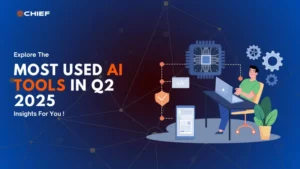Today in the rapidly growing world, we have many supply chain management challenges we have never experienced. The critically growing corner of this world and so is the rapidly increasing population; businesses seem to have a boom in customer demands. At this time, to meet the supply and demand goals, they need a fast and efficient way for delivery. But how do they boost their supply chain? To do so, we need to focus on advancing technology in the form of artificial intelligence. The use of AI in logistics and supply chain management is one of the most effective and efficient ways to meet goals and reduce the loss of elements related to different aspects of supply chain management. There are outnumbering AI use cases in the logistics and supply chain industry, and those numbers are rapidly growing daily.
A case study from the Economist newspaper shows that logistic companies will generate more than 2 trillion dollars by adopting AI in their processes at the end of the next twenty years. If you want to learn about machine learning in the logistics industry, what are the benefits of using AI in this industry, and why it is vital to adopt AI in the supply chain industry, then keep reading this article! We will discuss multiple use cases of AI in the transportation industry and learn how artificial intelligence is evolving the ways of management in these industries. So, let us start exploring.
Why Use Machine Learning in Logistics Essential?
When it comes to discussing the reason why we should use artificial intelligence logistics, there are so many reasons that come up. Whether we discuss the optimization of logistics operations or minimizing the mistakes that people make while working, there is a list of reasons why the use of AI in the transportation and supply chain industry is essential. In addition, in the supply chain industry, forecasting difficulties and possibilities are one of the essential edges that allow us to take precautions. AI intelligence in this field allows us to make assumptions and predictions based on the data from real time and previous events. The result of all these actions comes with the utmost customer satisfaction and a decrease in environmental and economic costs, which is the biggest goal of every logistics company.
It is predicted that by 2026, 75% of commercial supply chain management providers will swap for AI intelligence and data science. Machine learning in supply chain management can improve numerous business areas. Here are the real AI use cases in logistics that are evolving the ways of transportation with the help of artificial intelligence around the globe.
Planning For Logistics
The logistic segment of any business requires planning to coordinate with suppliers, customers, and different entities within an organization. As machine learning is good at analysis and numeric analytics solutions, they can facilitate planning exponentially. The following are the aids of this AI machine learning:
1. Forecasting of Demand
With the help of AI capabilities, organizations use them to forecast their efforts based on real-time data. That is why AI-powered demand prediction methods can help them to minimize the error rates as compared to the traditional ways of forecasting. With the help of improved demand forecasting, the following elements can be achieved easily:
- The manufacturers can optimize the number of dispatch vehicles to local warehouses and reduce costs with the help of improved manpower planning
- With the help of AI-powered demand predictions, local retailers can minimize the cost of holding and can invest their money elsewhere.
- And, the customers are less likely to bear the stockout, which can reduce their satisfaction level.
2. Planning for Supply
AI in logistics and supply chain management allows businesses to analyze real-time demand and optimize their supply management accordingly to keep the flow up. That planning allows businesses to reduce the waste of materials and use few resources through this dynamic planning capability with the aid of AI.
Warehouse Automation
The advancement of technology allows us to use online stores to buy lively stock and gives opportunities for online businesses to flourish. Every online store has a warehouse where they have their stock. The advancement of artificial intelligence allows them to cater to their management more efficiently and easily. By 2026, there will be a 60+ % chance that AI will take care of warehouses and all the related areas, such as inventory management and packaging. Here are the advancements of AI logistics in the automation of warehouses.
3. Warehouse Robots
The supply chain industry is getting advanced in warehouse management with the help of AI robotics. Many online business industries have a lot of robots in their warehouses to keep up the momentum of supply and demand. According to stats, the robotic market worth in 2021 was more than 4.7 billion dollars, which is expected to increase by 14% by the end of 2026. For example, Amazon bought Kiva Systems in 2012 and named it Azamon Robotics in 2015. And now, more than two hundred thousand robots are in their warehouse servicing different tasks flawlessly. Whether picking the packages, sorting them, moving them, or storing them in their designated area. These all are the aids of AI in logistics.
4. Detection of Damage Or Visual Inspection
One of the most amazing usages of AI in logistics is that it can detect damaged products according to their instructions. This capability allows businesses to ensure customer satisfaction, as damaged products can decrease the supplier’s credibility. This machine learning AI technology makes it possible for businesses to control the quality of their products and make a good relationship with customers.
5. Foreboard Maintenance
When it comes to detecting the potential failure in a machine based on real-time data with the help of IoT (Internet of Things), the use of AI comes with a handy approach. With the help of IoT sensors in a machine, we can detect the upcoming failure provided by AI-driven real-time data. This allows us to manage any unwanted situation and take precautions to keep the workflow seamless.
Autonomous Things
When discussing the evolution of AI in logistics, autonomous things are a great area to see its advancements. Autonomous devices work without the interaction or interference of humans. With the storm, machine learning occurs in that industry; we can observe many examples nowadays. A few decades before, who thought vehicles would drive fully and automatically without human interaction? It is the reality now, and we know it very well. Here are examples of the AI use cases in logistics in autonomous things:
6. Self-driving Vehicles
With the advancement in artificial intelligence, self-driving cars are taking place in the logistic transformation industry and decreasing the high dependency on human drivers. According to a recent survey, in the near future, you will see cars and trucks will be driven with the self-driving phenomena powered by AI. The use of technology will help to reduce the carbon emissions and fuel combustion of vehicles. Many famous companies, such as Google, Tesla, and Mercedes Benz, invest vast amounts of money in autonomous vehicles to support them. It is just a matter of time before you will see autonomous trucks and cars delivering your packages worldwide.
7. Delivery Drones
For the delivery of products, the use of delivery drones is now on the way to maintain the logistics of customers’ items. These autonomous drones are used to deliver products where businesses can go from the ground modes. One of the vivid examples of the usage of delivery drones can be seen in the pharmaceutical industry, where the shelf life span of medicines is short. Autonomous drones deliver medicines without any obstacles on the way, save time, and reduce the cost of storage facilities.
Analytics
When it comes to discussing the aids of AI logistics evolution in analytics, things get more exciting. In any industry, predicting the product demand and planning for the logistics before time allows one to save money and time and improve the service standards. The use of AI in dynamic pricing, when the demand seems to fluctuate, is one of the great ways to make it easier and more effective. The following is a real case of the usage of AI logistics in the analytic industry.
8. Time-Based Pricing
Time-based pricing or dynamic pricing is a phenomenon in which the prices of a product are impacted due to the fluctuation in demand, supply, price competition, and subsidiary item costs. The pricing software uses machine learning algorithms to analyze customer demand for a product. It estimates the demand ratio using real-time data and the history of customers’ behaviors so that the price of a product can be adjusted accordingly. This dynamic aid of AI logistics advancements allows businesses to make the right decisions for the production of products.
9. Route Optimization & Freight Management
Imagine running a business where you have to deliver food items using trucks. Your priority would be finding the best, shortest, and fastest route to deliver the food item. Here AI comes to assist you in analyzing the shortest route for your driver. By using an AI algorithm, the system starts to find the best route for your truck, which allows you to save your time and cost of freight. The use of AI logistics allows businesses to deliver their products faster, decreasing their cost of freight. Valerann is a real example of using an AI-based traffic management system that automatically delivers information about the roads and routes to the drivers. In addition, AI-based route optimizers help businesses reduce their carbon footprint, which is an excellent achievement of technology.
Corporate Industry
Every business has some tasks that happen behind the scenes, and when it comes to managing the movement of things like documents, taking care of those papers is one of the biggest concerns in any organization. Imagine there is a system that helps you not just analyze documents but also read them, pick important information, and neatly save them after organizing them. Here, AI logistics comes in handy. Following are the real applications of using AI logistics in offices.
10. Automating Document Processing
In any corporate sector in the logistics industry, invoices, bills, and rate sheets are essential elements we must deal with. These papers contain all the information about different entities like buyers, suppliers, and logistic service providers. Usually, we have to read the information from these papers and then feed them into a computer. There are high chances of human mistakes in the whole process. Here, AI logistics come with a handy approach. Documentation automation technologies based on artificial intelligence are highly efficient, save you from all this hectic stuff, and make your document processing easy and intelligent.
11. Automating Other Manual Office Tasks
Several office tasks are done manually and take time and resources. For example, making schedules of employees and tracking their attendance, generating progress reports, and answering business emails are some of the significant office tasks businesses have to do. For their completion, we have to hire resources. But with hyper-automation, using artificial intelligence in business processes allows you to automate these manual tasks with robotic process automation RPA, process mining, and other AI technologies. With the help of these technologies, businesses can automate many back-office tasks, such as making schedules of their employee’s working shifts, maintaining their attendance records, creating working reports to analyze productivity, and sending emails to the relevant stakeholders. These all are the aids of RPA bots based on AI technology.
12. Chatbots For Customer Service
Customer service is one of the most essential elements in any logistics company. It is so because customers will complain to the company if they have any trouble with the delivery of their product. Using chatbots that will provide service to customers allows for minimizing any inconvenience. These machine learning algorithms are just like mini call centers that serve the customers in the following manners:
- Respond to the customer’s questions
- Amend orders for customers
- Track the order
- Request for the delivery
Furthermore, AI chatbots also help to analyze customer experience. With the chatbot analytic metrics, businesses get information about their customers and try to make their buyer journey more seamless and resilient. This AI use case in logistics allows enterprises to get an insight into their audience behavior and helps them to alter their strategies accordingly.
Frequently Asked Questions
What is Meant By AI in Logistics?
The use of artificial intelligence in the logistics and supply chain industry is referred to as AI logistics. It provides smart, efficient, and accurate transportation and supply chain management solutions.
What are the benefits of AI in Logistics?
Route optimization, error minimization, excellence in forecasting demand, analyzing large data, and a lot of others are the aids of AI in the logistics industry.
What Is An Example of AI Use Cases in Logistics?
Scheduling and tracking are examples of using AI in logistics. The system of AI can make transportation schedules, organize routes for cargo, and have the ability to assign and manage employees. It can also track the packages in a warehouse.
What is the Example of using AI in the Supply Chain Industry?
There are many advancements in AI in the supply chain industry, as it can predict the delivery time of a product from the warehouse to the customer. Also, it can predict the demand ratio based on real-time data and the history of customers’ buying behavior.
Conclusion
The above discussion on AI use cases in the logistics and supply chain industry shows how handy AI is for humans. Whether it is about estimating the best and fastest route for delivery or getting real-time analytics to estimate the demand rate of products, using machine learning algorithms allows us to achieve perfection goals with autonomous solutions. The use of AI in the logistics industry saves you time and money. It provides insight into customer behaviors with chatbot AI that enables businesses to transform their ways to improve their customer experience.
















